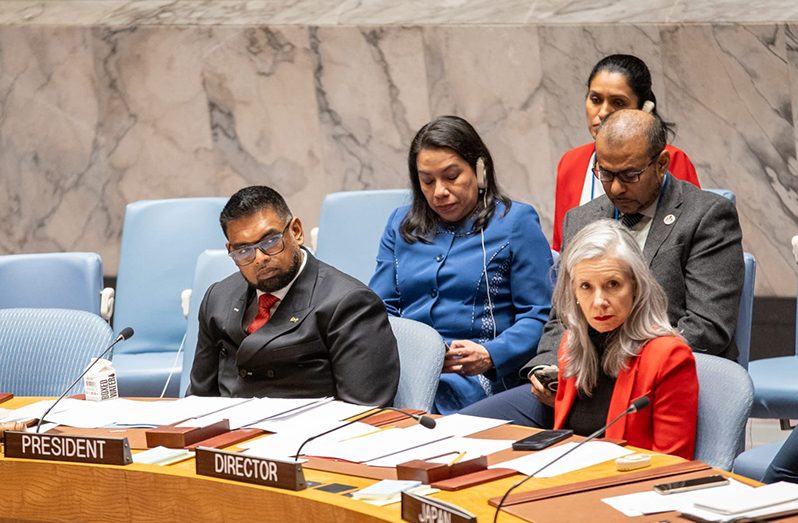– advocates development on climate change, food insecurity, peace
– as Guyana leads UN-Security council debate
GIVEN the growing interconnectedness of global challenges, there is a pressing need for the United Nations Security Council (UNSC) to adapt its approach in order to uphold international peace and security.
During the country’s presidency of the UNSC in February, President Dr. Irfaan Ali made this call to action on Tuesday.
This development arises during Guyana’s ongoing two-year tenure on the Council, which is one of the UN’s six principal organs dedicated to preserving international peace and security.
Addressing a pivotal open debate in New York, President Ali highlighted the critical intersections between climate change, food insecurity, and peace and security, advocating for a comprehensive revaluation of how these issues are addressed on the global stage.
The Head of State began his address by outlining the multifaceted crisis at the intersection of climate change, food insecurity, and conflict.
“The challenges to international peace and security continue to evolve. And our understanding and approach to these challenges must also continue to evolve and effectively address them,” President Ali stated, highlighting the dynamic nature of global threats and the necessity for adaptive strategies.
He presented stark statistics to the council, which painted a grim picture of the current state of food insecurity, exacerbated by climate change and conflict.
With an estimated 149 million Africans facing acute food insecurity, up by 12 million from the previous year, and a significant portion of these individuals living in conflict-affected regions, the urgency of the situation was made clear.
The President pointed out that these crises often create a vicious cycle of instability, driving up the need for humanitarian assistance and further straining international resources.
THE COST OF CONFLICT
President Ali also brought to the forefront the economic and environmental costs of conflict, citing the Africa Improved Foods (AIF) forecast that $5 billion is needed to eradicate hunger caused by war.
He explained that the impact of agricultural land taken out of production due to conflict was illustrated through the example of Ukraine, where damages and losses for agricultural enterprises have reached almost $4 billion.
This reality, according to him, sends millions of families into poverty, a fact often overlooked in discussions of war’s consequences.
Furthermore, the President shed light on the broader impacts of conflict, including war-induced displacement and forced migration.
With the United Nations High Commissioner for Refugees identifying at least 108 million forcibly displaced people worldwide, he said that the scale of the crisis has become evident.
Against this backdrop, President Ali stressed that these issues are not isolated but are deeply interconnected with the health of our planet, as seen in the 10 per cent increase in deforestation in conflict areas in 2020 and the significant CO2 emissions resulting from military activities.
A CALL FOR A TARGETED APPROACH
Throughout his address, President Ali called for a targeted approach by the UNSC to address these interconnected challenges.
He stressed the importance of recognising the role of climate change and food insecurity in exacerbating conflict and instability, arguing that these elements are often missing from the Security Council’s analysis.
“We have done very little because we do not see the interplay. And we do not place priority on these issues as a consequence of war and conflict,” Ali remarked, underscoring the need for a paradigm shift in how the international community approaches peace and security.
President Ali advocated for the Security Council to incorporate measures that address the effects of climate change and food insecurity in its procedures, emphasising the importance of a comprehensive analysis of these impacts.
This approach, according to President Ali, would ensure that humanitarian interests are safeguarded while addressing the broader consequences of conflict and war on food security and the climate.
GUYANA’S LEADERSHIP ON THE GLOBAL STAGE
Guyana’s stance was backed by the UNSE members, including UN Secretary-General António Guterres, welcoming the open debate on the impact of climate change and food insecurity on international peace and security.
“To avoid mounting threats to international peace and security, we must step in and act now to break the deadly links between conflict, climate, and food insecurity,” Guterres said.
Meanwhile, the Deputy Director-General of the Food and Agriculture Organisation (FAO), Beth Bechdol, told the council that scientific evidence and the policy direction are clear: climate change is compromising food security, and its impacts are a growing threat to international peace and security.
Similarly, Executive Secretary of the United Nations Framework Convention on Climate Change (UNFCCC) Simon Stiell said, “Climate change is contributing to food insecurity and to conflict. Rapid, sustained action to cut greenhouse gas emissions and to increase resilience is needed now….”
By opting for Guyana, it has underscored the importance of integrating these challenges into the Council’s agenda.
This move, according to President Ali, reflects a broader recognition of the need for holistic solutions to global problems, acknowledging that peace and security are intrinsically linked to environmental and humanitarian concerns.
Guyana is actively working with other countries to address climate change, food security, and related issues. As the current President of the United Nations Security Council, Guyana has taken a leadership role in promoting global action on these critical issues.
Additionally, Guyana has been a longstanding advocate for climate action and has taken steps to adopt a low-carbon development model, as outlined in its Low Carbon Development Strategy (LCDS).
The country’s commitment to ambitious climate action and its vulnerability to the adverse effects of climate change have positioned it as an important voice in global efforts to combat climate change.
Furthermore, President Ali has always emphasised the need for a balanced approach to climate talks, advocating for a discourse that considers the interests of both oil and gas producers and environmental concerns.
Guyana’s proactive stance on these critical global challenges has long showed its commitment to addressing the complex inter-linkages between climate, food, and peace.












